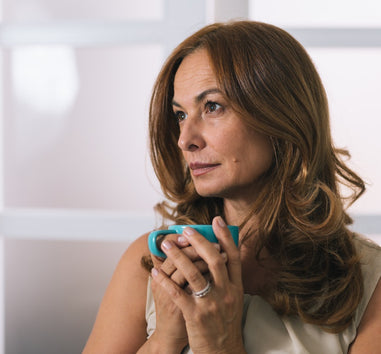A love/hate relationship with estrogen in menopause
Estrogen. The primary hormone that we talk about as women. Puberty, menstruation, ovulation, pregnancy, menopause... That’s kind of what we think about when it comes to estrogen, right? Well estrogen is a key part of all of these things! But what we want to talk about is how it plays into the bone health of females.

Estrogen and bone 101
Think back to our talk about osteoclasts and osteoblasts. Osteoblasts build bone, and osteoclasts consume bone. Estrogen actually impairs the activity of osteoclasts (Troy, et. al., 2018). So when we’re young and estrogen levels are high, we don’t have to worry about bone density as much as when we age. But it’s still very important to maintain bone mineral density by taking in calcium, vitamin D, and exercising.
Estrogen levels start to decrease around age 40 and reach its lowest levels between ages 50 and 55 (Cleveland Clinic). When estrogen decreases in our body, our bones are going to suffer and break down in greater quantities.
A lower bone mineral density puts us at greater risk for bone fractures and injuries. Estrogen protects us by maintaining the balance of building bone and breaking down bone (Skelton, Mavroeidi, 2018). This is a big reason why osteoporosis is such a big concern in people over the age of 60.
Nutrients for bone health in menopause
When women reach 50 years of age, bone breakdown and calcium loss has already begun due to a decrease in estrogen levels (Skelton, Mavroeidi, 2018). This is why calcium needs go up from 1000 mg to 1200 mg once we reach the age of 51, making calcium supplementation (along with vitamin D) essential (NIH: DRIs). While calcium needs go up, nutrient needs actually go down, which makes it even more difficult to take in this amount of calcium. Research has shown that supplementing with both calcium and vitamin D reduces the risk of bone fractures (Yao, et. al., 2019).
Women can be proactive about bone health in menopause by getting enough calcium and vitamin D.
Energy Levels
Going through menopause and feeling like you’ve lost all your energy? You’re not alone.
Estrogen plays a key role in energy metabolism. Your body is changing and entering this new phase of life where estrogen levels have dropped significantly and will stay at that new level. But on top of that, as your estrogen levels decrease, your Calorie needs go down as well. So not only do you feel like you can’t do as much, but your metabolism is going down, meaning you need fewer Calories.
↓ Estrogen and ↓ Calorie needs… Where are we supposed to get our energy from?!
Throughout our teenage and adult years of experiencing continuous cycles, our energy levels fluctuate every single week of every single month. We can think about menopause similarly to how we think about energy dips in our menstrual cycles. This phase of womanhood is almost exactly what you experienced during the low energy levels of your cycle, except now the low energy that’s experienced is the new norm.
One way to address these energy dips is to make sure you get the right nutrients from the diet. And supplement for the nutrients you might be not getting enough of from food alone.

Check out our assessment to find the right nutrition for you and make self-care easier in menopause.







